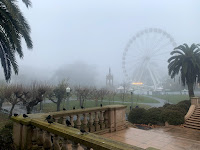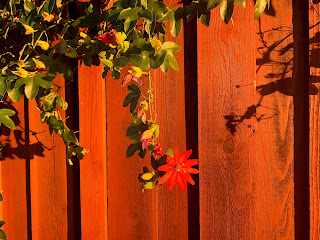“I don’t know,” he replied. “Am I my brother’s keeper?”
The Lord said, “What have you done? Listen! Your brother’s blood cries out to me from the ground. Now you are under a curse and driven from the ground, which opened its mouth to receive your brother’s blood from your hand. When you work the ground, it will no longer yield its crops for you. You will be a restless wanderer on the earth.”
Cain said to the Lord, “My punishment is more than I can bear. Today you are driving me from the land, and I will be hidden from your presence; I will be a restless wanderer on the earth, and whoever finds me will kill me.”
But the Lord said to him, “Not so; anyone who kills Cain will suffer vengeance seven times over.” Then the Lord put a mark on Cain so that no one who found him would kill him. So Cain went out from the Lord’s presence and lived in the land of Nod, east of Eden. (Genesis 4: 9 - 16, NIV)
Setting the scene with blue lupins
 |
| a few white flowers... |
"On the wide level acres of the valley the topsoil lay deep and fertile. It required only a rich winter of rain to make it break forth in grass and flowers. The spring flowers in a wet year were unbelievable. The whole valley floor, and the foothills too, would be carpeted with lupins and poppies. Once a woman told me that colored flowers would seem more bright if you added a few white flowers to give the colors definition. Every petal of blue lupin is edged with white, so that a field of lupins is more blue than you can imagine. And mixed with these were splashes of California poppies. Those too are of a burning color—not orange, not gold, but if pure gold were liquid and could raise a cream, that golden cream might be the color of the poppies. When their season was over the yellow mustard came up and grew to a great height. When my grandfather came into the valley the mustard was so tall that a man on horseback showed only his head above the yellow flowers. On the uplands the grass would be strewn with buttercups, with hen-and-chickens, with black-centered yellow violets. And a little later in the season there would be red and yellow stands of Indian paintbrush. These were the flowers of the open places exposed to the sun..." (Steinbeck 5).
"When June came the grasses headed out and turned brown, and the hills turned a brown which was not brown but a gold and saffron and red—an indescribable color. And from then on until the next rains the earth dried and the streams stopped... I have spoken of the rich years when the rainfall was plentiful. But there were dry years too, and they put a terror on the valley... The land dried up and grasses headed out miserably a few inches high and great bare scabby places appeared in the valley. The live oaks got a crusty look and the safe-brush was gray. The land cracked and the springs dried up and the cattle listlessly nibbled dry twigs... And it never failed that during the dry years the people forgot about the rich years, and during the wet years they lost all memory of the dry years. It was always that way" (S 6).

"Here there is abiding peace, the peace of God, and the serene security created by a handful of good neighbors living at one with the creature world, with noble, ancient trees, scrub and sage-brush, wild lilac and lovely lupin, with poppies and buzzards, eagles and humming birds, gophers and rattlesnakes, and sea and sky unending" (Miller 404).

"Here at Big Sur, at a certain time of the year and a certain time of the day only, a pale blue-green hue pervades the distant hills... There are two magic hours of the day which I have only really come to know and wait for, bathe in, I might say, since living here. One is dawn, the other sunset. In both we have what I like to think of as 'the true light': the one cold, the other warm, but both creating an ambiance of super-reality" (M 92).
"Speaking of artists, the curious thing is that few of this stripe ever last it out here. Is something lacking? Or is there too much... too much sunshine, too much fog, too much peace and contentment?" (M 13).
Lee Being Wise
 |
| memory is all we get |
'And memory.'
'Yes, memory. Without that, time would be unarmed against us.'" (S 376).
Lee: "'There's nothing sadder to me than associations held together by nothing but the glue of postage stamps. If you can't see or hear or touch a man, it's best to let him go'" (S 417). Hard to hear during this time when we're spread out all over the world, or when one's family lives far away. Or perhaps now that there's more than mere mail holding us together, such associations can continue?
'Yes, memory. Without that, time would be unarmed against us.'" (S 376).
Lee: "'There's nothing sadder to me than associations held together by nothing but the glue of postage stamps. If you can't see or hear or touch a man, it's best to let him go'" (S 417). Hard to hear during this time when we're spread out all over the world, or when one's family lives far away. Or perhaps now that there's more than mere mail holding us together, such associations can continue?
"Lee's voice said, 'I know that sometimes a lie is used in kindness. I don't believe it ever works kindly. The quick pain of truth can pass away, but the slow, eating agony of a lie is never lost. That's a running sore.'" (S 429).
Lee: "'Why am I content to be a servant?' (...) 'There are no ugly questions except those clothed in condescension. I don't know where being a servant came into disrepute. It is the refuge of a philosopher, the food of the lazy, and, properly carried out, it is a position of power, even of love. I can't understand why more intelligent people don't take it as a career—learn to do it well and reap its benefits. A good servant has absolute security, not because of his master's kindness, but because of habit and indolence. It's a hard thing for a man to change spices or lay out his own socks. He'll keep a bad servant rather than change. But a good servant, and I am an excellent one, can completely control his master, tell him what to think, how to act, whom to marry, when to divorce, reduce him to terror as a discipline, or distribute happiness to him, and finally be mentioned in his will... I don't know any profession where the field is so cluttered with incompetents and where excellence is so rare.'" (S 165-166).
Lee: "'Now, there are many millions in their sects and churches who feel the order, 'Do thou,' and throw their weight into obedience. And there are millions more who feel predestination in 'Thou shalt.' Nothing they may do can interfere with what will be. But 'Thou mayest'! Why, that makes a man great, that gives him stature with the gods, for in his weakness and his filth and his murder of his brother he has still the great choice. He can choose his course and fight it through and win (...) It is easy out of laziness, out of weakness, to throw oneself into the lap of deity, saying, 'I couldn't help it; the way was set.' But think of the glory of choice! That makes a man a man. A cat has no choice, a bee must make honey. There's no godliness there (...) I take my two pipes in the afternoon, no more and no less, like the elders. And I feel that I am a man. And I feel that a man is a very important thing—maybe more important than a star. This is not theology. I have no bent toward gods. But I have a new love for that glittering instrument, the human soul. It is a lovely and unique thing in the universe. It is always attacked and never destroyed—because 'Thou mayest.'" (S 303-304).
Lee: "'Laughter comes later, like wisdom teeth, and laughter at yourself comes last of all in a mad race with death, and sometimes it isn't in time.'" (S 497).Henry Miller Being Wise: "acquiring knowledge is like biting into a cheese which grows bigger with every bite" (M 176).
Lee: "You stand the [winter melon] in a pot, cut off the top carefully, put in a whole chicken, mushrooms, water chestnuts, leeks, and just a touch of ginger. Then you put the top back on the melon and cook it as slowly as possible for two days. Ought to be good.'" (S 487)
"After Will had gone Lee brought out one-third of a lemon pie and cut it in two. 'He's getting too fat,' Lee said." (S 427).Standalone Passages
"'When you're a child you're the center of everything. Everything happens for you. Other people? They're only ghosts furnished for you to talk to. But when you grow up you take your place and you're your own size and shape. Things go out of you to others and come in from other people. It's worse, but it's much better too.'" (S 578). |
| "Maybe the Bacigalupis would give him [Cal] a job" (S 537). Uncle Frank, our neighbor from North Beach, was an expert on the Bacigalupis! |
 |
| "Strawberries don't taste as they used to... "(S 129). |
In 2020: "Suppose we [the US] have the highest standard of living of any country in the world. Do we, though? It depends on what one means by high standards. Certainly nowhere does it cost more to live than here in America. The cost is not only in dollars and cents but in sweat and blood, in frustration, ennui, broken homes, smashed deals, illness and insanity. We have the most wonderful hospitals, the most gorgeous insane asylums, the most fabulous prisons, the best equipped and highest paid army and navy, the speediest bombers, the largest stockpile of atom bombs, yet never enough of any of these items to satisfy the demand. Our manual workers are the highest paid in the world; our poets the worst. There are more automobiles than one can count. And as for the drugstores, where in the world will you find the like? We have only one enemy we really fear: the microbe" (M 250).
"Samuel wrote to Joe, saying, 'I would be disappointed if you had not become an atheist, and I read pleasantly that you have, in your age and wisdom, accepted agnosticism the way you'd take a cookie on a full stomach. But I would ask you with all my understanding heart not to try to convert your mother... Your mother does not believe there are many ills uncurable by good strong soap. She puts your brave attack on the structure of our civilization down to a stomach ache. It worries her. Her faith is a mountain, and you, my son, haven't even got a shovel yet.'" (S 253).





